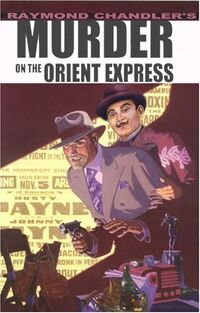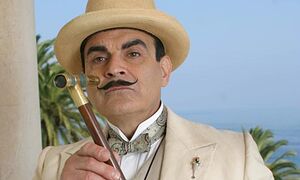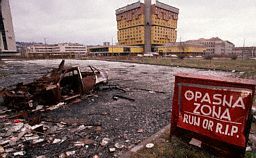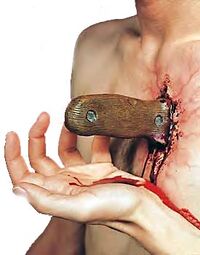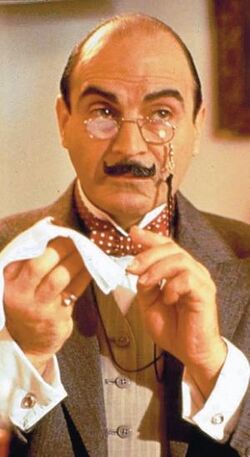Raymond Chandler's "Murder on the Orient Express"
In 1953 MGM planned a remake of the Agatha Christie classic, “Murder on the Orient Express”. Studio executives feared that American audiences would no longer take to an effeminately dressed Belgian detective with a waxed moustache (Hercule Poirot) and his unmarried gentleman companion, Captain Arthur Hastings. They looked for a writer with experience of the detective genre who could translate the British idiom of Christie’s original to something more meaningful in Des Moines. But who could take on such a task with the delicacy required?
The answer was obvious. An Anglo-American writer of detective fiction of unimpeachable reputation, Raymond Chandler, was hired and immediately suggested teaming up Poirot with his own creation – former metaphysical poet, Marlowe. This allowed for a narration in the hard-bitten gum-shoe style familiar from Sam Spade movies and a style audiences would find more acceptable. Chandler called his screenplay “Dead Dagoes Don’t Drive Diesels!” but MGM refused to rename the project claiming the title would alienate an important section of its potential audience - steam enthusiasts.
SCENE ONE: Istanbul Station, March 4th, 1935
Marlowe (narrating): Istanbul’s no place for a real man; I guess that’s why Poirot stayed there so long. But even the dullest flatfoots wise up eventually and Poirot needed to leave in a hurry. He hadn’t planned on the Orient Express being fully booked.
Poirot: But I am world famous detective, Hercule Poirot, you must ‘ave room for me!
Ticket Clerk: I’m sorry, sir. All the accommodation is full… perhaps next week?
Poirot: But it is imperative I leave now, at once!
Marlowe: Maybe if you’d asked that bell-hop at the Ritz how old he was before giving him the champagne you made him bring to your room...
Poirot: It was ‘ardly my fault he spilled it on his trousers! I cannot be blamed for ‘elping him out of them – they needed to be dried.
Marlowe: Yeah, I know the rest. You heard a noise at the door and tried to stand up while he was still sitting on your lap and that’s when the vice cops broke in.
A heavily perfumed Italian gentleman enters, wearing an extravagant cravat.
Poirot: Bianchi!
Bianchi: Poirot! How delightful to see you again
They embrace in the continental style. Marlowe turns away.
Poirot: Phillip, this is my old friend, Bianchi, director of the Orient Express. We ‘aven’t seen each other in years.
Marlowe: Yeah, I got ex-es I don’t keep in touch with too.
Poirot: Is that why you did not telephone after Paris?
Marlowe: After Paris I was so busy drinking to forget I forgot to call.
Bianchi: I see you’re having trouble buying a ticket. No trouble. You can bunk with me, there’s plenty of room.
Poirot: Once again, Bianchi, you find me a bed for the evening. ‘ow will I ever repay you?
Marlowe: I think I can guess. I’ll stretch out in the mail-car. That way you won’t feel embarrassed by having an audience.
SCENE THREE: Orient Express, March 6th 1935
Marlowe (narrating): Poirot travelled first class. He always travelled first class. I don’t think he knew other classes existed. He had plenty of company. There was Ratchett – the loud sort of rich American that convinces foreigners all Americans are rich and stupid, even the poor and stupid ones like me. I don’t suppose he spared a glance for Mrs Hubbard – who’d clearly looked in the cupboard and not found it bare, she was so wide I think she had a double cabin to herself. Count and Countess Andrenyi and Princess Dragomiroff were royalty, if Russian Royalty counts. The only other first class passenger was Mr Hardman, a name that will have brought a smile to those Belgian lips. Dick Hardman at that. When Poirot heard that he must have licked those old lips raw.
In Second class was Ratchett’s secretary, the promisingly titled McQueen. Also Hildegarde Schmidt, a buttoned-up Heidi wannabe who was Princess Dragomiroff’s maid. Greta Ohlson had the name of a star of special interest Swedish films but the looks of a drug-store Indian. And Foscarelli – he said he was a Chicago car-salesman but I didn’t believe him for a moment, he didn’t try to sell me a second-hand Cadillac that was good for another 80,000 miles.
After the first night, Poirot got a compartment to himself. Maybe he snored; maybe it was the garlic mushrooms. I stretched out on the mail-bags again despite Poirot’s offer of accommodation. I got enough male-companionship in the pokey.
I woke before dawn. The train wasn’t moving but either the room was spinning or I was. Once again I swore to cut back on the hooch. Snow was blocking the railroad and a hangover was already blocking my mind. Only one of these things melted with the addition of more Scotch. Poirot sent for me. Bianchi was urging him to investigate the mysterious death of Ratchett.
Bianchi: Hercule, there is a body is cabin 12, I don’t think he died of natural causes. You must solve this mystery before we reach the next stop. There are no police here and there is the reputation of the Orient Express to consider.
Poirot: And where is the next stop?
Bianchi: Belgrade.
Marlowe: Yugoslavia? We’ll be lucky to make it there with only one murder.
Poirot: Nonsense, I ‘ave always ‘ad fun exploring the Balkans.
Bianchi: Please, Hercule, you must explore this body minutely and see what you can coax out of it.
Marlowe: Said like a man who’s spoken those words before.
SCENE FIFTEEN: Cabin 12, Orient Express, March 6th 1935
Marlowe (narrating): Last time I saw Ratchett he’d looked better. Last time his face wasn’t grey and no one had painted the words “Die, Scum” on his forehead in blood. The knife sticking out of his ribs was new too.
Bianchi: Well?
Poirot: I think you are right, Bianchi, this man may ’ave been murdered.
Marlowe: I’ve seen less convincing suicides.
Poirot searches the man’s case. He carefully inspects each article, minutely examining and sniffing each piece of clothing, lingering over the underwear.
Marlowe: Three of these wounds were inflicted by south-paws.
Poirot: Left-‘anders are always sinister.
Marlowe: The other five wounds were inflicted by right-handers, but only three are deep enough to have been fatal. As for the other two, I’ve done worse shaving.
Poirot: Oui, bien sur. But why does a man of fifty three years travelling abroad bring but three pairs of underwear, all of them thongs?
Marlowe: Maybe he liked to go commando. Maybe he’d heard you were coming along for the ride and thought he’d get lucky. Maybe he’s up there smiling down at you, pleased you’ve put his panties in your pocket to "analyse" later.
Poirot: And ‘ow did 'e come to be stabbed without waking and alerting the consierge?
Marlowe: You should check your bag. See if anyone stole the Rohypnol you picked up in Turkey.
Poirot: I am an expert in the stiffness of bodies and judging by the level of rigor mortis I would say Monsieur Ratchett ‘as been dead since per'aps 1 am. I ‘eard the conductor attend to ‘im at midnight. Ratchett said ‘e must ‘ave called out in a nightmare. There was a lady walking along the corridor in a red kimono but I gave ‘er no ‘eed.
Marlowe: No kidding.
Bianchi: But what shall we do?
Poirot: I shall need the passports of every passenger and a sample of underwear from each of them.
Bianchi: To take a scent? In case the perpetrator tries to escape and we need to send bloodhounds after them?
Marlowe: Something like that. I’ll just bring this linen handkerchief embroidered with the initial "H. M." that I found on his night-stand, this pipe cleaner that was in the ashtray next to it along with these two spent matches of different sizes, this charred paper with writing still legible on it and this cigar butt. I'll bring this button from a conductor's uniform too – you know, in case they might be significant. You never know when some meddling kids will come along and make the pieces fit together.
Poirot: If it amuses you.
SCENE EIGHTEEN: Outside the Pullman Car, Orient Express, March 6th 1935
Marlowe (narrating): The passengers assembled in the Pullman. Considering the luxurious surroundings they didn’t seem that pleased to be there. You can’t please everyone, I guess. Miss Ohlsen seemed nervous. She hung back like she didn’t want to go inside. I didn't want to go inside either but staying in the corridor with Ohlsen wasn't much of an alternative. She ran her hand up my thigh. I think she was admiring the crease I’d put in my pants. Her breasts were doing something to me, they were the kind of breasts a bishop would kick in a plate-glass window to get at. Her face was doing something too; it was making me regret breakfast.
Miss Ohlsen: So you're a private detective. I didn't know they existed, except in books, or else they were greasy little men snooping around hotel corridors.
Marlowe: You must be thinking of Poirot. He’s waiting for you up there. After all these years I think he’s finally planning to come out.
Miss Ohlsen: Do I have to attend this meeting? I’m not sure he’s really interested in women. I'd much rather stay here with you.
Marlowe: You know, I collect blondes. And bottles. But seeing you I’ll stick to bottles in future.
Miss Ohlsen: Please don't make me go in there, crowds make me nervous.
Marlowe: Then we're even, desperate Eleanor Roosevelt lookalikes make me nervous.
Miss Ohlsen stand on one leg to reach up and nuzzle Marlowe's neck. Her hand slips inside his trench-coat.
Miss Ohlsen: Come to my cabin, you don't know what you're missing. I'll close the drapes - all cats are grey in the dark.
Marlowe: Will you turn out the lights? That way I could sneak out without you spotting me.
Miss Ohlsen turns away, visibly hurt.
Miss Ohlsen: Must you be so cruel? I know I disgust you but I can't help myself - you're just so cute!
Marlowe: What you see is nothing; I got Mickey Mouse tattooed on my buttocks. When I clench, he flips you the bird.
Poirot: (from inside the dining car) Come in, Miss Ohlsen, we cannot start without you and you are wasting your time trying to seduce Marlowe. God knows I 'ave tried!
SCENE NINETEEN: Inside the Pullman Car, Orient Express, March 6th 1935
Mrs Hubbard: A man entered my room last night. Don’t you agree he must have been looking for poor Mr Ratchett – to murder him?
Poirot: But in the dark ‘ow can you be so sure it was a man?
Marlowe: Seriously, Poirot, you’re asking her that question?
Poirot: And you, McQueen. You were his secretary. Isn’t that usually a position taken by a woman?
Marlowe: Easy, tiger.
Poirot: And what did you do for Mr Ratchett exactly?
McQueen: He liked to travel but had no facility for languages, I helped him out. I pick things up easily.
Poirot (sighing): As do I, but fortunately, in three short years penicillin will be discovered. And did Mr Ratchett tell you much of ‘imself?
McQueen: Nothing! Until the letters arrived. You know the sort of thing – “Prepare to Die”, “I’m gonna kill U”, “Get Cash 4 Gold?”
Marlowe (examining the notes): And each of them of 12 characters and each in at least two different handwritings!
Poirot: Trifles! Did you know that Ratchett offered me $15,000 to be his bodyguard?
McQueen: No, but he was in the habit of offering large sums to men he had just met in order to secure their services.
Marlowe: And you say he wasn’t Belgian? You know, Poirot, when you hold this burned paper up to the light it says Charles Lindbergh Jnr.
Poirot: The Lindbergh baby, my biggest failure. ‘ow I admired Charles Lindbergh! That man ‘ad flown the Atlantic solo! ‘e was an ‘ero! And yet ‘is shorts smelled of failure.
Bianchi: Mrs Lindbergh miscarried another baby with the shock of the kidnapping, Linbergh shot himself in grief and the maid who the police suspected threw herself under a pram.
Marlowe: A pram?
Bianchi: Perhaps it was a tram – I heard the story on a shortwave radio.
Marlowe: Seems like Mr Ratchett was really Cassetti the man tried for the kidnapping and acquitted. Who’d have thought that having a big bank account and access to expert legal advice could get you off a crime in LA?
Poirot: I never believed that ‘e did it. In my expert opinion it is always the butler who is responsible. And since the Lindbergh’s ‘ad no butler, I personally provided the evidence Mark Fuhrman planted so the maid could be arrested.
Marlowe: You know, I hate to spoil the party, but I think in Ratchett's case everyone did it.
Poirot: Incroyable! You are mad, Marlowe, the whisky is doing something to your brain.
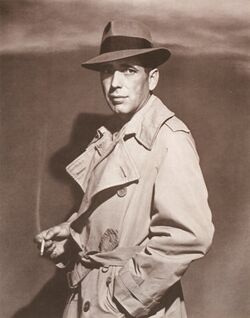
Marlowe: And Greta’s hand did something to my pants, even if she looks like my landlady’s plainer sister - the one who died last year. But unless some stranger sneaked onto the train while we were speeding through Thesalonika, it seems like each one of them has a motive to wipe out this scumbag. And each of them left a clue to incriminate one of the others.
Poirot: Absurde!
Marlowe: You think? McQueen would never have left one of his own handkerchiefs embroidered with his initials if he was the only perp. Last time I saw Mrs Hubbard she was dancing at Big Mama’s Outsize Burlesque joint on The Strip. Back then she was Linda Goldenberg, mother of Sonia Goldenberg, later Sonia Lindbergh. If you read as much Hello! magazine as I do, you’d know Countess Andreyi was born Helena Goldenberg – Sonia’s sister. Princess Natalia Dragomiroff was in the Lindbergh christening special issue; she was godmother. Even Fräulein Hildegarde Schmidt had her picture in there for making the cake – she was the family's cook, Foscarelli was the chauffeur, Greta was the nurse and Hardman was the security guard on duty when the kidnapping happened.
Poirot: It could be coincidence that they were all ‘ere at the same time.
Marlowe: And it could be that the Tooth Fairy did it but he didn’t have the same motive as these guys 'cause all Ratchet's teeth were store-bought. I'm telling you, Poirot, they tailed this scum-bag across three continents and planned it together. They drugged his sorry ass and sneaked in one at a time to stab him in the dark!
Poirot: Creeping around in darkness, inserting foreign objects into men’s bodies – why was I not informed before? Marlowe, as we ‘ave just entered Zagreb please phone the Gendarmerie immediately.
Cut to Marlowe speaking on the telephone.
Marlowe (on phone): Oh, no, Sergeant. I wouldn’t like to do that. Neither would my daughter...
He hands the phone to Poirot.
Marlowe (to Poirot): He says why are you calling him on a Sunday in the middle of the ethnic cleansing season?
Poirot: Inspector, come at once and arrest Marlowe. 'e 'as long been jealous of my reputation as the world's premier detective and is a notorious 'omophobe. I believe ‘e sneaked into the compartment to try to kill me and killed Ratchett by mistake. Since then 'e 'as attempted to cast blame on everyone in the train but 'imself. I knew 'e was a potential murderer from the very first time I smelled 'is long-johns.
Epilogue
Sadly, “Raymond Chandler’s Murder on the Orient Express” was the only collaboration between the two master detectives. Marlowe died in a Serbian jail in 1942. The real Inspector Poirot became a prison visitor, eventually contracting Switzerland’s first civil partnership with Mad-Dog Frankie Fritzel. Now over 110, he is still pursuing a claim to the right for conjugal visits through the European Court of Human Rights.
| Featured version: 13 March 2011 | |
| This article has been featured on the main page. — You can vote for or nominate your favourite articles at Uncyclopedia:VFH. | |
| ||||||||||||||
| Batman Erupts (unreleased) ♦ The Big Sleep (1946) ♦ Dirty Harry (series, 1971–) ♦ Good Burger (1997) ♦ Goodfellas (1990) ♦ Howard the Duck (1986) ♦ Million Dollar Baby (2004) ♦ Murder on the Orient Express (1953) ♦ Pandaface (1985) ♦ Pulp Fiction (1994) ♦ Super Troopers (1997) ♦ Who Framed Roger Rabbit? (1988) |
